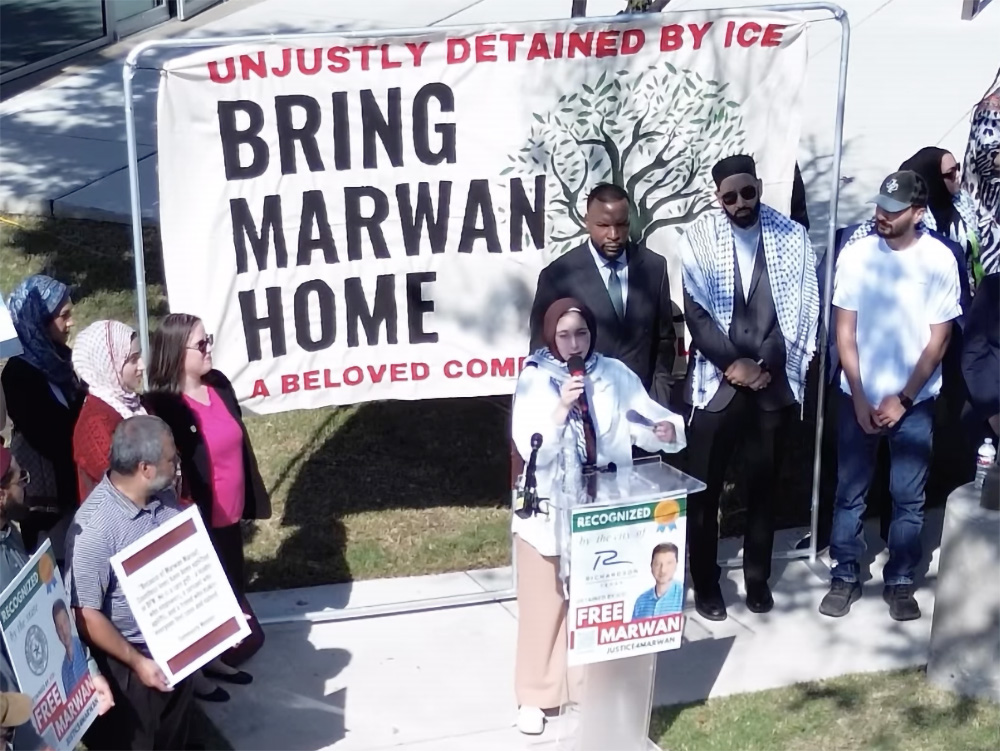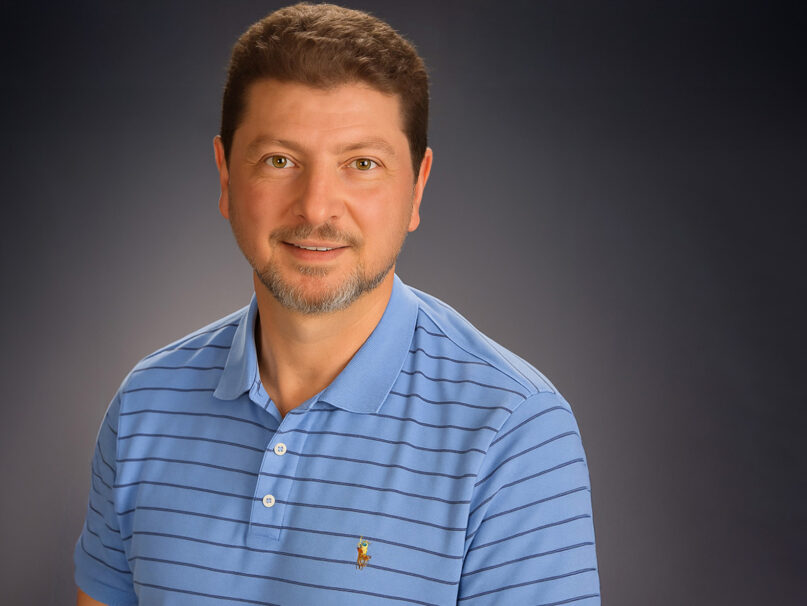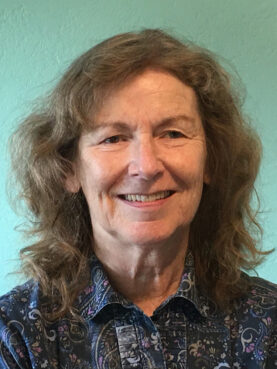
(RNS) — Advocates raised concerns about what they see as the Trump administration’s efforts to criminalize pro-Palestinian activism at the Arab Convention in Dearborn, Michigan, last weekend. The arrest of Marwan Marouf, a Dallas Muslim community leader placed in United States Immigration and Customs Enforcement detention last week, was seen by some as a wake-up call.
During an ArabCon panel, Zahra Billoo, executive director of the Council on American-Islamic Relations’ San Francisco Bay Area chapter, said Muslim and Arab American activists and organizations could be disproportionately affected by recent legislation constraining criticism of Israel. One speaker cited anti-boycott, divestment and sanctions policies and antisemitism awareness acts, which tend to consider much criticism of Israel as antisemitism, passed in dozens of states.
“Everything we lost in 2001, we don’t really have it back,” Billoo said, referring to what she called civil rights Arab and Muslim Americans lost in the wake of 9/11 amid the “war on terror.” “… Whatever passes now, stays in place and we have to keep that in mind when we are fighting. … And the people we lose will stay behind bars.”
Billoo quickly transitioned to the case of Marouf, whose green card was denied allegedly due to his donations in the 1990s to the Holy Land Foundation for Relief and Development, a prominent Muslim charity later charged with providing funds to Hamas-run groups. Arguments used in 2002 to bring criminal charges against the Holy Land Five — the charity’s leaders convicted of diverting funds to Hamas-run groups — were used in Marouf’s case, she noted. She said Marouf is now “facing consequences decades later.”
Recently, connections to the now-defunct foundation have been used as evidence of support for terrorism by governmental agencies and some conservative lawmakers. For Muslim American advocates and nonprofit watchdogs, seeing the foundation cited in this context has prompted angst, as some believe the trial was conducted amid flawed litigation procedures of the post-9/11 years.
Marouf, who is being detained at the Texas Bluebonnet Detention Facility, has a bond hearing scheduled for Monday (Oct. 6). Born in Kuwait, Marouf is a Jordanian citizen of Palestinian heritage. The 54-year-old moved to the U.S. 30 years ago on a student visa to pursue his master’s degree.

Marwan Marouf. (Photo courtesy of the Muslim American Society of Dallas Fort Worth)
RELATED: Longtime Muslim community leader placed in ICE detention in Dallas after green card is denied
In an emailed statement to Religion News Service, Tricia McLaughlin, Department of Homeland Security assistant secretary, said Marouf “had overstayed his visa” and was denied a green card because of his “involvement with a foundation that provided material support for Hamas, a designated Foreign Terrorist Organization.”
“A green card is a privilege, not a right,” McLaughlin said in her statement. “If you are pushing Hamas propaganda, supporting terrorist organizations, and conducting other anti-American actions, you will face consequences.”
The Muslim Legal Fund of America, which is representing Marouf in his immigration case, argued his green card application, which he started around 2012, was denied after ICE “started throwing up roadblocks by mischaracterizing his charitable effort.” On Friday (Sept. 26), MLFA denounced his arrest as being “part of a campaign from the Trump administration to retaliate against Palestinians and their allies.”
“Let us be clear: Marwan’s arrest and detention is pretextual and emblematic of this administration’s broader campaign to weaponize immigration law as a tool to silence Palestinians, their allies, and others whose viewpoints it finds inconvenient or threatening,” the group’s statement reads.
MLFA’s statement said Marouf donated to and volunteered with HLF in the 1990s, before the organization lost its tax-exempt status in November 2003, as part of the Islamic obligatory practice of donating to charity known as zakat. Marouf’s volunteer work included assisting at fundraising events, according to MLFA. He was never an HLF employee, and “there was no way for Marwan — or the thousands who donated and volunteered alongside him — to know that HLF would later be accused of prohibited activities,” the statement said.
The government’s decision to consider Marouf’s activities with the HLF as “material support” for terrorism sets “a dangerous precedent, opening the floodgates to punish entire communities for lawful, good-faith humanitarian activity,” Marouf’s lawyers argued.
Founded in 1989, HLF was a common recipient of Muslim Americans’ donations in the 1990s, particularly during Ramadan. The organization, which raised $13 million in 2000, sent donations to Palestinians in the West Bank and Gaza.
After Hamas was designated a terrorist group in 1995, HLF’s donations prompted a high-profile criminal trial in 2002, resulting in the 2008 conviction of five of its leaders to prison sentences between 15 and 65 years. During the trial, prosecutors highlighted meetings between HLF founders and Hamas leaders and invitations to speak at HLF fundraising events addressed to Hamas leaders, as evidence that HLF leadership knew zakat committees — the local groups collecting and distributing donations made by faithfuls — benefited some Hamas members. The defendants, who denied they intended to send money to Hamas but sent funds for humanitarian purposes, claimed they were being targeted for their political beliefs and Palestinian identity.
RELATED: America and US Muslims have come a long way since 9/11. We have a long way to go.
Kay Guinane, the founder of the nonprofit watchdog organization Charity & Security Network, referred to the trial as a “selective prosecution,” as other charities that donated to the same types of causes, including the U.S. Agency for International Development, didn’t face legal action.

Kay Guinane. (Photo courtesy of Charity & Security Network)
“This case was something of an outlier because it violated so many constitutional norms and was so politically hot of an issue that it hasn’t served for much of a legal precedent for anything,” she said. “But politically, it’s had a very serious, chilling impact.”
Guinane, who ran a program of the federal Office of Management and Budget protecting nonprofits’ constitutional rights at the time of the trial, said concerns over lack of due process were brushed aside amid the climate of fear that prevailed after 9/11.
“It’s hard to describe the atmosphere in the country at that time, but there was just in the air kind of a lot of Islamophobia,” she said. “And these people, because they spoke very strongly about Palestinian rights and (were) very critical of Israel, that constituted for them (prosecutors), knowledge of Hamas connections.”
Recently, Sen. Tom Cotton, R-Arkansas, requested the IRS review CAIR’s nonprofit status for its alleged “deep ties to terrorist organizations,” citing evidence from the HLF trial.
RELATED: Sen. Cotton urges IRS to review CAIR’s nonprofit status, alleges ties with terror groups
In an email statement to RNS, CAIR said Cotton’s allegations were based on “debunked conspiracy theories” and an “un-American political stunt straight from the McCarthy era.”
At CAIR, leaders have begun discussing strategies to protect members from retaliation for their activism, particularly those who aren’t U.S. citizens, Billoo said.
“Being private doesn’t protect them from the fact that they’re Arab or Muslim or Palestinian, or somebody looked at them and thought they were suspicious,” Billoo told RNS at the convention. “You see organizers say, ‘I won’t get in trouble if I don’t do the political.’ It’s like, ‘No, your existence is political.’”
Ulaa Kuziez contributed to this report.
